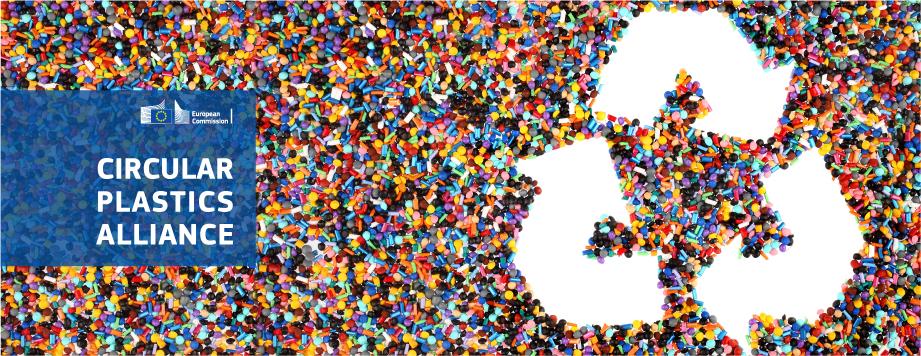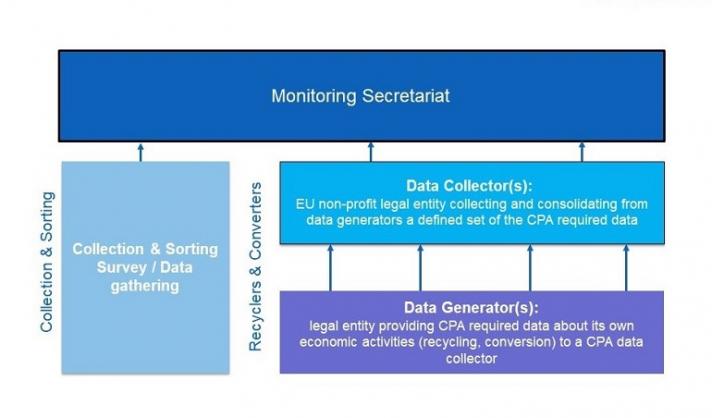The Circular Plastics Alliance takes action to boost the EU market for recycled plastics. The alliance publishes its deliverables on this page.

Commitments to action
All the key deliverables announced in the declaration of the Circular Plastics Alliance and listed in the summary of the alliance’s commitments for action have been published below.
Design-for-recycling of plastic products
Plastics recycling starts with recyclable plastic products.
The updated work plan on design-for-recycling of the alliance lists 26 plastic product categories that the alliance commits to make recyclable.
Collecting and recycling the plastic waste arising from these 26 product categories would be more than sufficient to achieve the 10 million tonnes target (these products account for over 60% of plastic waste collected in Europe). However, currently about half of this waste goes to sorting centres and less than half reaches recycling plants.
To ensure the 26 priority products are recyclable by 2025, the CPA has developed design-for-recycling guidelines, as input for European standards (CEN and CENELEC). The goal is to help these design-for-recycling guidelines become the new normal for products placed on the European market.
A path to 10 million tonnes of recycled plastics
Achieving the European Commission’s 2018 target of 10 million tonnes of recycled plastics used in the EU by 2025 requires producing an additional 3.4 million tonnes of recycled plastics in Europe by 2025 (compared to 2020). Therefore, sorting capacities should increase by at least 4.2 million tonnes by 2025 and recycling capacities by at least 3.8 million tonnes. This corresponds to estimated investment needs between € 7.6 billion and € 9.1 billion.
See the CPA ‘roadmap to 10 million tonnes’ for the details of the analysis.
Achieving the target requires that 10 million tonnes of recycled plastics are used to make products in Europe by 2025 (compared to 4 million tonnes in 2018). A sufficient and stable supply of quality recycled plastics is a prerequisite. The report proposes solutions to achieve this goal, including new European standards for recycled plastics. The CPA calls on national authorities to join and work together to deliver the required systemic change in the single market.
See the CPA report on uptake of recycled plastics for the details of the proposed solutions.
To reach the target, over 80% of the increase in recycled plastics should come from packaging, the remainder from the other sectors covered by the CPA (agriculture, construction, automotive and electrical and electronics). The analysis is based on underlying calculations by the alliance’s working groups for their respective sectors. Sectors currently not represented in the alliance (e.g. textiles, furniture, leisure) are assumed to see no increase in their use of recycled plastics by 2025.
The path to 10 million tonnes proposed by the CPA builds on previous work by the alliance, including a state-of-play on collected and sorted plastic waste in Europe and an R&D agenda for circular plastics. The state-of-play report showed that the economic sectors represented in the CPA account for over 70% of the plastic waste collected in Europe (21 million tonnes), out of which 44% is currently sorted for recycling. The report summarised challenges to increasing the collection and sorting of plastic waste and improving data on collected and sorted waste, which requires help from public authorities across Europe.
A European monitoring system
The CPA established a monitoring system to track progress towards 10 million tonnes of recycled plastics produced and used in Europe by 2025. This is the first-ever EU-wide monitoring system on recycled plastics. As per the CPA declaration, this system is transparent and trusted, with auditing and traceability of both the system and data.
See all documents related to the CPA monitoring system
The CPA has approved two platforms for collecting data in compliance with the CPA monitoring rules and methodology
- MORE, managed by EuPC, collecting data only on the use of recycled plastics
- RecoTrace managed by PolyREC, collecting data on both the production and use of recycled plastics
All companies producing or using recycled plastics in Europe are requested to report their data to the CPA via one of these platforms and become ‘data generators’ (see graph below). This does not require joining the CPA but companies are welcome to do so.
Data auditing is essential to ensure reliability and accuracy. Data generators and collectors need to ensure the data they report to the CPA monitoring system has been audited according to the CPA audit framework. They can use one of the CPA approved independent auditors to do this. See the list of auditors. Other interested auditors can apply for approval by the CPA by sending application form B to GROW-ENV-RPLASTICS-PLEDGE ec [dot] europa [dot] eu (GROW-ENV-RPLASTICS-PLEDGE[at]ec[dot]europa[dot]eu). The CPA Monitoring Secretariat reviews applications based on the evidence provided. All documents submitted should be in English.
ec [dot] europa [dot] eu (GROW-ENV-RPLASTICS-PLEDGE[at]ec[dot]europa[dot]eu). The CPA Monitoring Secretariat reviews applications based on the evidence provided. All documents submitted should be in English.
Next steps
The CPA will regularly update its analysis of the path to 10 million tonnes, in cooperation with all interested national stakeholders and authorities. The CPA will publish its first monitoring report in early 2024. The CPA calls on national authorities in charge of waste management and circular economy to join and work together to deliver systemic change in the single market.

